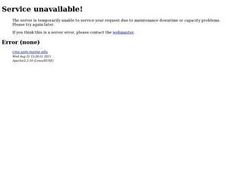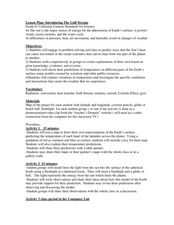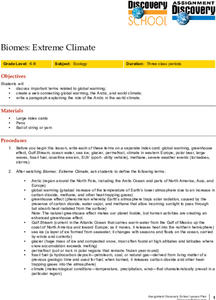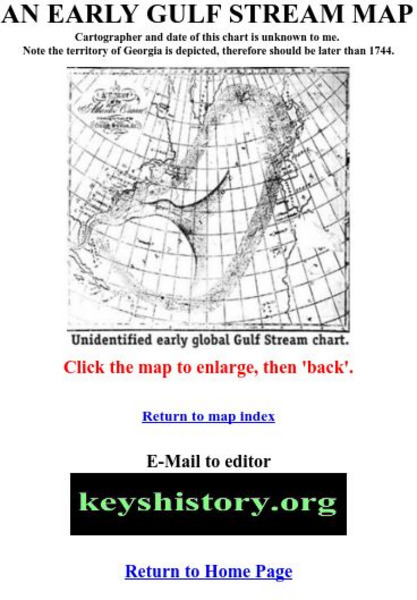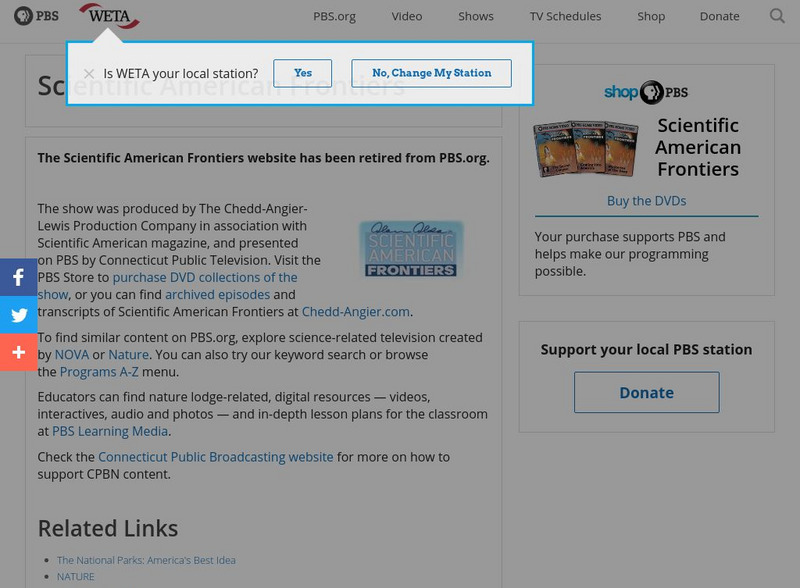Curated OER
Message in a Bottle - A Satellite Journey through the Gulf Stream
The Gulf Stream has historically provided humans with a faster trade route because of its swift-moving waters. It continues to be a source of information and fascination for oceanographers today. As your class views this collection of...
Curated OER
Faking It
Middle school earth scientists describe the behavior of the Coriolis force. They compare and contrast conditions under which the Coriolis force has a significant impact with conditions under which it has very little. They model the...
Curated OER
THE GULF STREAM
Students explore how to describe the Gulf Stream, how Benjamin Franklin charted it, and correctly plot it on a map.
Curated OER
History of the Current
Students, in groups, collect information from the Internet about historical events surrounding the effects of the Gulf Stream current on ship travel. They compile a chart and answer assessment questions.
Curated OER
Currents and Climate
In this ocean currents worksheet, students will compare two different currents found in the Atlantic Ocean to determine how currents affect the climate in these regions. This worksheet has 3 short answer questions.
Curated OER
Hurricane and Tornadoes Group Creative Writing
Creating science literacy through writing gets scholars thinking about the context of scientific terms! Learners collaborate to write a short story about hurricanes and tornadoes in a group. Students have 25 minutes to write the story,...
Curated OER
Introducing The Gulf Stream
Sixth graders research the average temperatures of different places on Earth. In this earth science lesson, 6th graders explain how the sun's heat cause ocean movement. They discuss how temperature change affects the weather we experience.
Curated OER
So, What's it Doing Today?
High schoolers describe short-term variations in oceanographic parameters in the Gulf Stream. In this ocean habitats lesson plan students use satellite imagery to obtain information in the Gulf Stream.
Curated OER
Biomes: Extreme Climate
Students create a web connecting global warming, the Arctic, and wold climate. They write a paragraph explaining the role of the Arctic in world climate.
Curated OER
Sea Surface Temperature Trends of the Gulf Stream
Students use authentic satellite data to produce plots and graphs of sea surface temperature as they explore the seasonal changes of the Gulf Stream.
Curated OER
Ring Detectives
Young scholars describe the overall flow of the Gulf Stream, and explain how it affects biological communities in the North Atlantic Ocean.Students describe Gulf Stream rings, and explain how they are formed.Young scholars be abl
Curated OER
Regions of the US: Gulf Stream, States and Their Capitals
Fifth graders identify one way of dividing the US into geographical regions and then consider alternate ways of doing the same. They locate each of the fifty states and their capitals on a map. They research the Gulf Stream region.
Curated OER
Warm up to the Gulf Stream
Students find out the temperature difference between the Gulf Stream and the surrounding water. They locate the Gulf Stream on the infrared image of the eastern seaboard of the US.
Gulf of Maine Research Institute
Gulf of Maine Aquarium: Comparing Oceans: Warm Up to the Gulf Stream
This site features some background information and a satellite image of the Gulf Stream that you can analyze using information also given at the site. There is a link to an activity about the formation of eddies along the Gulf Stream as...
Texas A&M University
Ocean World: Bringing the Ocean to the Classroom
Online resource for students and teachers to see information on icebergs, fisheries, coral reefs, waves, currents and more. Provides teachers with learning activities. Has its own ask-an-expert site (Ask Dr. Bob), and provides real-time...
NASA
Nasa: Sea Surface Temperature Trends of the Gulf Stream
Students investigate changes in the surface temperatures of the Gulf Stream over the course of the seasons using data collected by NASA's satellites. The data is inputted into a spreadsheet and graphed.
US Navy
Naval Historical Center: The Bermuda Triangle
The Naval Historical Center offers straightforward facts and information from the US Coast Guard about the area known as "The Bermuda Triangle." While the site does not deny that there have been some disappearances and "traceless...
BBC
Bbc: News: Guide to Climate Change
The BBC offers an interactive guide to climate change, including a sliding scale depicting climate change from 1885 to 2099, animation which explores how the greenhouse effect works, and detailed diagrams exploring the carbon cycle, the...
Other
Florida Keys History Museum: An Early Gulf Stream Map
This is one of the earliest maps of the Gulf Stream, probably after 1744.
Center for Educational Technologies
Nasa: Classroom of the Future: Spheres: Hydrosphere
Use this site to learn about the millions and trillions of gallons of water that covers the earth, known as the hydrosphere.
CK-12 Foundation
Ck 12: Earth Science: How Ocean Currents Moderate Climate
[Free Registration/Login may be required to access all resource tools.] Looks at how ocean currents transfer heat from one place to another.
Alabama Learning Exchange
Alex: Compass Skills Scavenger Hunt
During this instructional activity middle schoolers take a reading with a compass and use the compass to reach multiple checkpoints. Students also demonstrate their knowledge by locating specific coordinates that spell out a phrase.
PBS
Pbs Teachers: Expedition Panama: Bridge That Changed the World
Investigate the Coriolis effect on the directional flow of currents by measuring linear speeds at different places on the globe. Create a timeline demonstrating geologic time.
Museum of Science
Museum of Science: Ocean Currents
An introduction to ocean motion that focuses on ocean currents. Includes instructions for conducting an experiment to further understanding.




